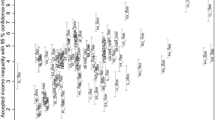Abstract
What is the relationship between income inequality and the values people endorse? Using survey data from all thirty-four OECD countries over a period of almost thirty years, we investigate the following dimensions of value systems: work ethic, civism, obedience, honesty, altruism, and tolerance. In most cases, no robust relation to income inequality is detected. However, we find some evidence that larger income disparities are associated with a stronger work ethic. This suggests that income inequality might spur hard work not only through pecuniary incentives but also because it makes people attach a symbolic value to being laborious.
Similar content being viewed by others
References
Aghion, P., Algan Y., Cahuc, P., Shleifer, A.: Regulation and distrust. Q. J. Econ. 125(3), 1015–1049 (2010)
Algan, Y., Cahuc, P.: Civic virtue and labor market institutions. Am. Econ. J.: Macroecon. 1(1), 111–145 (2009)
Atkinson, A.B., Brandolini, A.: Promise and pitfalls in the use of “secondary” data-sets: income inequality in OECD countries. J. Econ. Lit. 34, 771–799 (2001)
Auriol, E., Renault, R.: Status and incentives. RAND J. Econ. 39, 305–326 (2008)
Balan, D.J., Knack, S.: The correlation between human capital and morality and its effect on economic performance: theory and evidence. World Bank, Policy Research Working Paper 5720 (2011)
Berry, H., Guillén, M., Zhou, N.: An institutional approach to cross-national distance. J. Int. Bus. Stud. 41(9), 1460–1480 (2010)
Cervellati,M., Vanin, P.: “Thou shalt not covet . . . ”: prohibitions, temptation and moral values. Working Papers 2010.54, Fondazione Eni Enrico Mattei (2012)
Corneo, G.: Income inequality, value systems, and macroeconomic performance. Amsterdam, AIAS, GINI Discussion Paper 17 (2011)
Corneo, G.: Work norms and the welfare state. CESifo Econ. Stud. 58(4), 599–625 (2012)
Corneo, G., Jeanne, O.: A theory of tolerance. J. Public Econ. 93, 691–702 (2009)
Corneo, G., Jeanne, O.: Symbolic values, occupational choice, and economic development. Eur. Econ. Rev. 54, 241–255 (2010)
Corneo, G., Neher, F.: Income inequality and self-reported values. SFB/TR 15 Discussion Paper No. 382 (2012)
Doepke, M., Zilibotti, F.: Occupational choice and the spirit of capitalism. Q. J. Econ. 123, 747–793 (2008)
Deininger, K., Squire, L.: A new data set measuring income inequality. World Bank Econ. Rev. 10(3), 565–591 (1996)
Di Tella, R., Dubra, J.: Peronist beliefs and interventionist policies. NBER Working Papers 16621, National Bureau of Economic Research (2010)
Dobler, C.: The impact of institutions, culture, and religion on per capita income. Discussion paper nr. 28, Evangelisches Studienwerk e.V. Villigst, Oldenburg (2009)
Fehr, E., Hoff, K.: Introduction: Tastes, castes and culture: the influence of society on preferences. Econ. J. 121, F396–F412 (2011)
Giuliano, P., Spilimbergo, A.: Growing up in a recession: beliefs and the macroeconomy. NBER Working Papers 15321, National Bureau of Economic Research, Inc. (2009)
Gorodnichenko, Y., Roland, G.: Which dimensions of culture matter for long run growth. Am. Econ. Rev. 101(3), 492–498 (2011)
Gradstein, M.: Work attitudes and intergenerational mobility. J. Hum. Cap. 3(3), 268–288 (2009)
Guiso, L., Sapienza, P., Zingales, L.: Civic capital as the missing link. NBER Working Paper 15845, National Bureau of Economic Research, Inc. (2010)
Halla, M., Lackner, M., Schneider, F.: An Empirical analysis of the dynamics of the welfare state: the case of benefit morale. Kyklos 63(1), 55–74 (2010)
Heinemann, F.: Is the welfare state self-destructive? A study of government benefit morale. Kyklos 61(2), 237–257 (2008)
Inglehart, R.F., Baker, W.: Modernization, cultural change, and the persistence of traditional values. Am. Sociol. Rev. 65, 19–51 (2000)
Inglehart, R.F., Welzel, Ch.: Modernization, Cultural Change, and Democracy: The Human Development Sequence. Cambridge University Press, New York (2005)
Knack, S., Keefer, P.: Does social capital have an economic payoff? A cross-country investigation. Q. J. Econ. 112(4), 1251–1288 (1997)
Lindbeck, A.: Hazardous welfare-state dynamics. Am. Econ. Rev. 85(Papers & Proceedings), 9–15 (1995)
Lindbeck, A., Nyberg, S.: Raising children to work hard: Altruism, work norms, and social insurance. Q. J. Econ. 121(4), 1473–1503 (2006)
Ljunge, M.: The spirit of the welfare state? Adaptation in the demand for social insurance. J. Hum. Cap. 6, 187–223 (2012)
Maystre, N., Jacques, O., Thoenig, M., Verdier, T.: Product-based cultural change: is the village global? CEPR Discussion Papers 7438 (2009)
Milanovic, B.: Global inequality recalculated and updated: the effect of new PPP estimates on global inequality and 2005 estimates. J. Econ. Inequal. 1, 1–18 (2011)
Minkov, M., Blagoev, V.: Cultural values predict subsequent economic growth. Int. J. Cross Cult. Manag. 9–1, 5–24 (2009)
Moulton, B.: An illustration of a pitfall in estimating the effects of aggregate variables on micro unit. Rev. Econ. Stat. 72, 334–338 (1990)
Neher, F.: Essays on aspects of culture in economics. Dissertation, Free University of Berlin (2012)
OECD: Growing Unequal? Income Distribution and Poverty in OECD Countries. OECD Publishing (2008)
OECD: Divided We Stand: Why Inequality Keeps Rising. OECD Publishing (2011)
Östling, R.: B. E. J. Econ. Anal. Policy 9, 1 (2009)
Schaltegger, Ch. A., Torgler, B.: Work ethic, protestantism and human capital. Econ. Lett. 107, 99–101 (2009)
Schneider, S., Torgler, B.: What shapes attitudes toward paying taxes? Evidence from multicultural European countries. IZA Discussion Papers 2117, Institute for the Study of Labor (2006)
Solt, F.: Standardizing the world income inequality database. Soc. Sci. Q. 90, 231–242 (2009)
Tabellini, G.: Culture and institutions. DP 6589, CEPR (2007)
Tabellini, G.: The scope of cooperation: values and incentives. Q. J. Econ. 123, 905–950 (2008)
Wilkinson, R., Pickett, K.: The Spirit Level. London, Bloomsbury Press (2009)
You, J., Khagram, S.: A comparative study of inequality and corruption. Am. Sociol. Rev. 70, 136–157 (2005)
Author information
Authors and Affiliations
Corresponding author
Electronic Supplementary Material
Below is the link to the electronic supplementary material.
Rights and permissions
About this article
Cite this article
Corneo, G., Neher, F. Income inequality and self-reported values. J Econ Inequal 12, 49–71 (2014). https://doi.org/10.1007/s10888-013-9246-7
Received:
Accepted:
Published:
Issue Date:
DOI: https://doi.org/10.1007/s10888-013-9246-7




